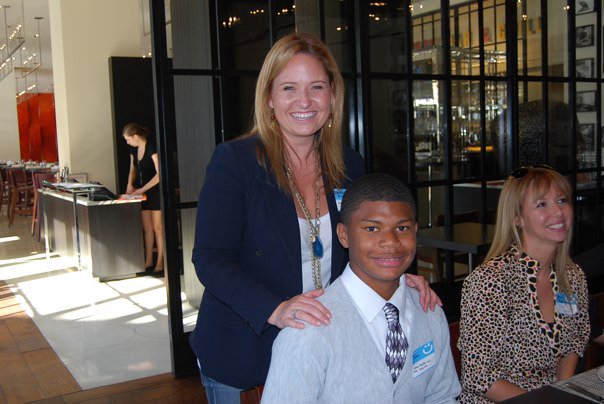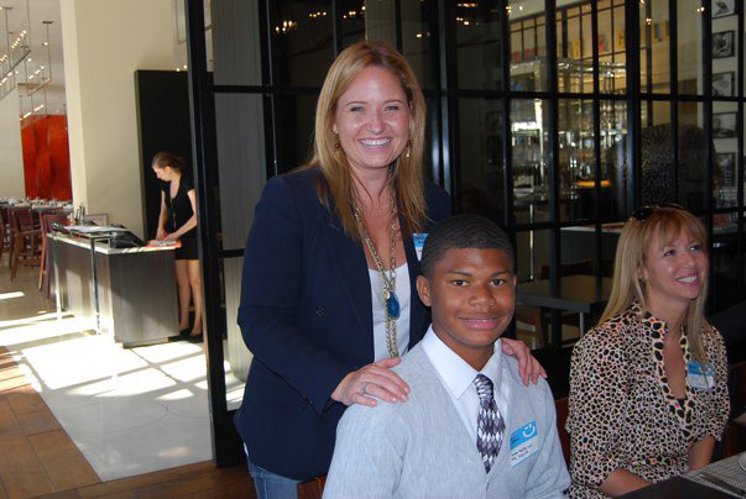How to Motivate Students to Think about their Future Career Path During a Pandemic
June 22, 2020
By Jennifer Clark, ECMC Foundation Contributing Writer


Exploring Your Potential’s Jennifer Kushell with Jordan, a student she worked with. He graduated college and will be pursuing his master's in the fall.
“Be really honest here. To what degree are you currently making important life decisions for yourself or others?”
The future-oriented critical thinking sparked by this question is one of the simple, but insightful, aspects of Exploring Your Potential (EYP), an online career readiness platform created by Jennifer Kushell and informed by her years of work on youth empowerment, employment, and entrepreneurship. The aim of EYP, which Jennifer co-founded with David Stine, is to develop custom pathways for individual students that draw on their personal experience and interests, increasing their motivation and dedication to their learning and career path in the process.
“So much of education is built around a young person following the rules, or trying to fit in, or following a pathway to get them to some higher place of success,” Jennifer says. “But that’s all dictated by other people.”
EYP uses technology to provide an individualized experience to more than 10,000 students around the world. This ‘scalable intimacy’ has been informed by Jennifer’s 25 years of experience working globally on youth employment and entrepreneurship programs. From the Australian Government to Boston Public Schools and from Bank of America to MTV, Jennifer has advised campaigns to reach young people all over the world. She wrote The New York Times bestseller, Secrets of the Young & Successful, and her work on youth employment and engagement has taken her to over 50 countries.
But even for an experienced leader like Jennifer, edtech can be a hard field for developing and growing a business. “Edtech takes years. You’re literally working in the gap between the traditional education system, the future of technology and the future of learning.”
In addition, Jennifer acknowledges that getting funding has been a challenge at times, a common experience for women entrepreneurs. Last year, less than three percent of all venture capital funding went to startups founded by women.
“It’s make or break for a lot of us,” Jennifer admits. “We’re putting every resource, every hour, every ounce of anything that we have into these companies to make them succeed but it is harder for us to raise money.” Jennifer is used to the ups and downs of starting a business. Raised in a family of entrepreneurs, Jennifer found an early pathway in entrepreneurship, and started her first business at the age of 13. At 19, she harnessed the interconnectivity of the early web to start Young Entrepreneurs Network, one of the first online communities on CompuServ. Five years later, she released her first book, No Experience Necessary: The Young Entrepreneurs Guide to Starting a Business. She credits this early exposure to different people and career directions as the inspiration behind Exploring Your Potential.
Throughout Jennifer’s years of working on entrepreneurship and youth programs, she was struck by a constant theme she kept seeing no matter what country she was in: all students struggled to connect their own experience to the pathways they saw set out for them.
“Billions of dollars are invested in youth employment programs, workforce planning and workforce training, but ultimately, they give young people an a la carte menu,” Jennifer says. This lack of exposure to options can hamper a student’s motivation to pursue their education or a find a meaningful career path.
Motivating students to continue their learning and preparing them for the workforce is especially critical now, as the COVID-19 pandemic upends how we work and learn. Jennifer believes that a tool like Exploring Your Potential can be particularly helpful for students from underserved backgrounds, who may have fewer supports available to them to navigate their career options. The shift to online has left many students behind, particularly students from low-income backgrounds, and Black and Latinx students.
But EYP, an online learning platform, was well positioned to adapt to the rapid shift to online instruction. “Our biggest pivot has been making sure that the product is accessible to as many students as possible.” EYP can now integrate directly into schools’ online learning management systems, making distribution to students much easier and cheaper, while also giving teachers a useful tool for engaging students through distance learning.
“Schools have enormous opportunity right now to get to know their students, to build closer bonds, to convince them to stay in school, and to show them that they really do care about them as individuals,” Jennifer says. For students who are struggling to navigate the changes brought on by the pandemic, this individualized support can help keep them engage at a time when it is especially tough to stay focused and motivated.
EYP’s swift move to make the platform available to more students as COVID-19 closed campuses was made possible by a $100,000 investment from ECMC Foundation through their #InvestInWomen Program. The Program, organized by ECMC Foundation and Chloe Capital, provides needed capital to early stage, social impact companies founded by women that focus on workforce and edtech solutions.
The investment has helped EYP position its platform at the intersection of the future of learning and work, advancing Jennifer’s mission that began 25 years ago. “I hope that what we’ve been able to accomplish in the two months since we’ve gotten this award is evidence of what we’re capable of.”
